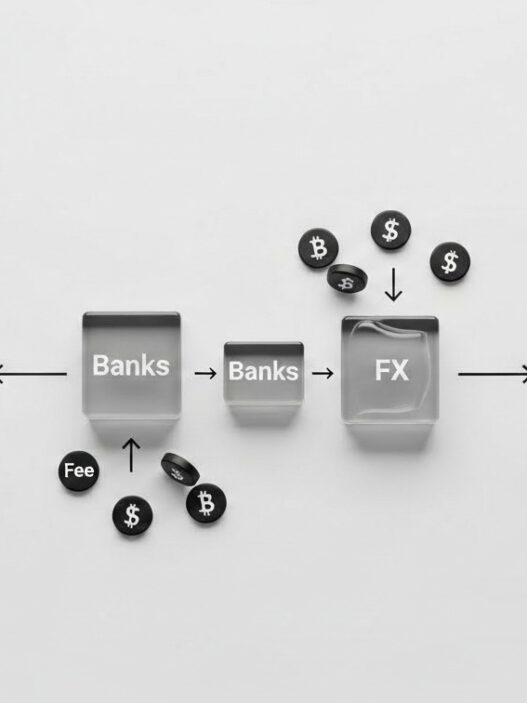What Is Decentralized Identity and Why It Exists
The age of logging in with your email and surrendering personal data is ending. In 2025, identity is no longer a login — it’s a layer of infrastructure.
Decentralized identity (DID) is the framework replacing outdated, centralized credential systems. Instead of giving tech giants control of your passport numbers, medical records, and financial data, DID puts you in the driver’s seat — cryptographically verified, tamper-proof, and completely portable.
At its core, a DID is a globally unique identifier tied to your digital identity but not issued by a corporation or government. It lives on the blockchain — a self-owned key that proves you are who you say you are, without revealing everything about you.
Why does this matter now?
Because identity is the new asset — and elite individuals, founders, and Web3-native travelers are demanding privacy-first systems that reflect their autonomy. Whether you’re booking a private jet with crypto or onboarding to a members-only health concierge, you need a credential system that moves with you, not one that sells you.
DIDs solve a critical modern paradox: how to build trust without exposure.
They’re how you unlock digital doors — from exclusive token-gated clubs to borderless fintech ecosystems — without giving away your personal blueprint.
How Decentralized Identity Works in Real Life

Decentralized identity sounds abstract — until you use it.
Here’s what actually happens when you control your digital ID:
- You generate a DID (Decentralized Identifier) — a globally unique string of characters registered to the blockchain. It isn’t tied to your passport, phone number, or government-issued ID.
- You store that DID in a digital wallet — think MetaMask, DIDs on Polygon, or smart ID tools from Aptos, Linea, or Moonbeam.
- You collect verifiable credentials — signed proofs of facts about you (like “I’m over 21,” “I have flight clearance,” or “I’m a PrivateCharterX verified client”). These are cryptographically issued, timestamped, and impossible to forge.
- You decide what to share — not the platform. You can prove you have a Swiss bank account without sharing the account number. Or verify travel clearance without showing a passport scan.
A use case: flying private
Instead of submitting sensitive documents for every new flight, your DID unlocks a secure, verified profile with:
- Your KYC credentials
- Crypto wallet history
- Health clearance status (if required)
- Custom preferences — champagne type, seating, dietary notes
It’s frictionless, and it travels with you — whether you’re chartering from Zürich or Monaco.
The system speaks for you — without you speaking at all.
Why Ultra-Wealthy Travelers Are Adopting Advanced Privacy Protection

For the 0.01%, digital privacy luxury travel is no longer optional — it’s essential infrastructure.
In a world where data breaches, identity theft, and travel tracking cost billionaires millions in security risks, advanced luxury travel privacy protection offers something rare: complete control over personal information.
Ultra-wealthy individuals, family offices, and high-profile executives—including those who work with elite luxury travel advisors—are adopting sophisticated digital privacy luxury travel systems because they:
1. Eliminate Redundant Security Screenings
Flying private? Checking into exclusive resorts? Applying for residency programs? Normally, each requires extensive personal documentation that creates vulnerability points.
With advanced luxury travel privacy protection, a single encrypted verification authorizes access — from private jet terminals to five-star properties — without exposing sensitive data.
2. Control What Information Gets Shared (And With Whom)
Modern digital privacy luxury travel systems allow selective disclosure — confirming facts (like membership status or creditworthiness) without revealing personal documents.
This shifts the power dynamic: you, not the service provider, control what information gets shared. Professional concierge services can verify your preferences without accessing your personal data.
3. Create Seamless Cross-Border Mobility
The global elite live between jurisdictions: Zürich, Dubai, Singapore, Miami.
Luxury travel privacy protection becomes their secure passport across borders, financial systems, and exclusive properties. Whether coordinating Zurich luxury car rentals or private banking services, it links legal, financial, and lifestyle credentials in one protected identity layer.
4. Future-Proof Against Emerging Threats
Digital privacy luxury travel isn’t just about 2025. It’s protection against what happens after traditional security gets compromised. It’s insurance against deepfakes, AI fraud, and the collapse of conventional identification systems—especially critical for private jet membership programs and high-value travel coordination.
Digital Privacy Luxury Travel: PrivateCharterX’s Seamless Security System

In elite travel, friction is the real enemy. Jet delays, paperwork bottlenecks, mismanaged arrivals — all burn time, attention, and reputation.
That’s where digital privacy luxury travel becomes more than security — it becomes strategic advantage.
PrivateCharterX Is Already Implementing the Future
At PrivateCharterX, we’re building seamless integration between high-net-worth flyers and the infrastructure that moves them — with advanced luxury travel privacy protection as the authentication layer.
Here’s what our digital privacy luxury travel system unlocks:
- One-Touch Verification: Authenticated once, applied across all private jet charter bookings, luxury concierge services, and visa-prep workflows
- Borderless Pre-Clearance: Advanced privacy systems enable pre-cleared travel through select partner FBOs and immigration partners
- Dynamic Luxury Rewards: Secure preference systems allow for personalized perks — rewards based on travel frequency, membership status, or exclusive credentials
No QR codes. No paperwork. Just seamless presence.
Private Aviation as Your Secure Access Portal
By integrating luxury travel privacy protection with flight profiles, a PrivateCharterX aircraft becomes more than transportation. It’s a secure mobility hub — authenticating access and coordinating luxury experiences in real time.
Imagine this: a flight from Zürich to Singapore automatically coordinates ground transfer, activates real-time luxury booking approvals, and grants access to exclusive health optimization suites — without speaking to a single agent.
This isn’t theory. It’s being quietly implemented through our luxury travel advisor network.
Building Your DID – Tools, Wallets, and Real-World Integration
Creating your decentralized identity isn’t just a Web3 flex — it’s an unlock code for sovereign travel, seamless authentication, and personalized luxury.
Step One: Choose Your Infrastructure
To build a secure, verifiable DID, you’ll need a blockchain-powered protocol that supports identity layers. The best in class right now:
- Polygon zkEVM – Scalable, Ethereum-compatible, privacy-forward
- Polkadot – Strong for cross-chain integration and interoperability
- Aptos – Built for speed and smart contract performance
- Dock – Specifically focused on verifiable credentials and DID issuance
Each of these supports the creation and anchoring of a unique, cryptographically signed identity. This identity can represent you, your business, or even your vehicle or aircraft.
Step Two: Install a Digital Identity Wallet
Your DID lives in a digital wallet — think of it as your passport, briefcase, and security clearance badge in one.
Top-tier options include:
- Dock Wallet – Purpose-built for verifiable credentials
- Web3Auth – Easy integration with wallets like MetaMask and mobile keys
- SpruceID / DIDKit – Advanced dev tooling and privacy-grade credential sharing
Your wallet holds your DID, lets you share claims selectively, and signs interactions — from booking a flight to proving your club membership.
Step Three: Integrate with the Physical World
This is where theory becomes power:
- Scan your DID at a private terminal for immediate check-in and baggage routing.
- Unlock crypto-based access to resort properties that respect verifiable credentials.
- Trigger dynamic insurance, dietary prep, or airspace priority based on real-time identity metadata.
When combined with PrivateCharterX systems, your DID becomes the connective tissue between intention and experience.
The Future of Luxury Identity – From Passports to Permissionless Prestige

DID isn’t just another buzzword floating through crypto Twitter.
It’s a foundational layer of a new world where your reputation, rights, and access are encoded — not granted. And the luxury ecosystem is taking notice.
Physical Passports Are Becoming Obsolete
Governments still require passports, but elite travelers are already piloting alternatives:
- Biometric verification layered with DID for smoother immigration in jurisdictions like the UAE, Estonia, and Singapore.
- Tokenized residency status on-chain, enabling access to tax perks, healthcare, or legal rights — all provable from your wallet.
- Jet clearance, property access, and medical records? Streamlined through a single, user-controlled digital ID.
This is more than convenience. It’s control.
Your Reputation Becomes a Passport
In a decentralized system, your history isn’t erased — it’s encrypted and authenticated. That means:
- A verified DID tied to clean flight behavior could unlock express clearance at airfields and charter hubs.
- Your DAO contributions or on-chain reviews might earn you curated invites to ultra-private experiences.
- Verified Web3 credentials could even replace corporate bios — giving high-trust access without third-party gatekeepers.
The old system needed referrals. This one runs on provable value.
The Rise of “Permissionless Prestige”
The next evolution of status isn’t about followers — it’s about verified contribution, capability, and trust.
Imagine:
- A decentralized invite system where your luxury travel history gets you into future villas, not past marketing lists.
- PrivateCharterX unlocking loyalty upgrades, not because you bought them — but because your identity proves you belong.Revolutionary Web3: How Blockchain is Transforming the Digital Landscape (2025)
- Digital keys that grant access to off-market properties, experiences, or investment opportunities based on your encrypted rep.
DID isn’t just your new ID. It’s your signal.
Final Thoughts: Identity Is the New Asset Class
In the age of AI-generated everything, authenticity is currency — and decentralized identity is its protocol.
For elite travelers, crypto-native founders, and global operators, DID offers more than digital autonomy. It’s a future-proof passport to luxury, mobility, and privacy that doesn’t depend on governments, platforms, or gatekeepers.
This isn’t about trends. It’s about building systems that respect your intelligence, protect your presence, and reflect your evolution.
Take the Next Step with PrivateCharterX
Ready to experience luxury that moves at the speed of innovation?
PrivateCharterX is where jet-set strategy meets Web3 infrastructure. From personalized charters and AI-powered concierge to tokenized loyalty systems and DID integration — we build the future of elite mobility.
→ Request your PrivateCharterX consultation here
Your identity isn’t a login. It’s your launchpad.





















